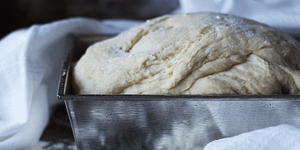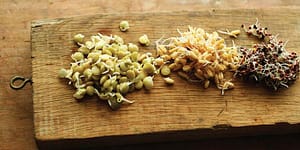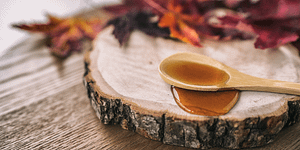Lacto-Fermenting: A Faster Way to Ferment Vegetables

Looking for a faster way to ferment your vegetables? Lacto-fermenting, a fermentation method widely used in Japan, involves a special glass or plastic container that has a device for constantly pressing down the vegetables. With this method, you’ll be ready to eat your fermented veggies in as little as a few days!
The following is an excerpt from Preserving Food Without Freezing or Canning by Gardeners & Farmers of Terre Vivante. It has been adapted for the web.
Lacto-Fermenting Snow Peas and Cucumbers
Ingredients:
- ¼ lb. snow peas
- 1 cucumber
- Ground ginger
- 1 teaspoon salt
- A bit of sake (rice wine)
- A bit of soy sauce
- Seasoning to taste
- Glass or plastic pressure jars
Procedure
Remove the tough parts and string, but do not shell, the pea pods. Cook the peas for two to three minutes in hot water; then dip them immediately in cold water. Mix the drained peas with sliced cucumber. Put them in a pressure jar and press down. Eat with a dressing made separately, using the sake, soy sauce, ginger, and other seasonings.
Lacto-Fermenting Eggplant and Chrysanthemum Petals
Ingredients:
- 1 lb. eggplant
- ¼ lb. dried chrysanthemum petals
- 2 or 3 whole cayenne peppers
- 1 tablespoon kombu seaweed
- 2 tablespoons salt
- Glass or plastic pressure jars
Procedure
Slice the eggplant into ½-inch thick rounds, and let them dry in the sun for one day. Finely chop the peppers. Put the chrysanthemum petals at the bottom of the jar, and add salt. Layer, alternating two slices of eggplant with pieces of kombu seaweed, peppers, and salt, until all ingredients have been used. Press the mixture down firmly in the jar; loosen slightly once the liquid appears. The mixture will be ready to eat in two or three days. Keeping time is limited to about one week.
—Michel Mangin, Aix-en-Provence
Recommended Reads
Recent Articles
Want to spice up your traditional bread recipes? This salt-rising bread recipe by fermentation expert Sandor Ellix Katz has all the simplicity, flavor, and uniqueness you’ve been searching for! The following is an excerpt from Sandor Katz’s Fermentation Journeys by Sandor Ellix Katz. It has been adapted for the web. What Is Salt-Rising Bread? Salt-rising…
Read MoreNothing says “spring” like a fresh, foraged meal! Savor the flavors of the season with this Milkweed Bud Pizza recipe.
Read MoreWhat’s so great about oyster mushrooms? First, you can add them to the list of foods that can be grown indoors! They are tasty, easy to grow, multiply fast, and they love a variety of substrates, making oyster mushrooms the premium choice. The following is an excerpt from Fresh Food from Small Spaces by R. J.…
Read More








